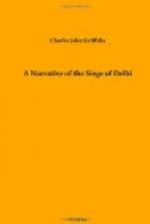[From Lord Roberts’ “Forty-one Years in India.” By kind permission.]
Still, the day’s work was not over. A village to the rear was found to be occupied by the enemy, and the Punjab Rifles were ordered to take it. They met with a most obstinate resistance, their young commander, Lumsden, being killed. The General then sent part of my regiment to dislodge the rebels, but we met with only partial success, and had one officer, named Elkington, mortally wounded, the enemy evacuating the place during the night.
We passed the night of the 25th in the greatest discomfort. Hungry and wet through, we lay on the ground, snatching sleep at intervals. Poor Gabbett died of internal haemorrhage soon after he received his wound, and his death deprived the regiment of one of its best and bravest officers, and me of a true friend. He had shared my tent on the march down and during the whole campaign, a cheery, good-hearted fellow, and one who had earned the respect of officers and the love of his men. The General was particularly struck with his bravery, and with feeling heart wrote a letter to Gabbett’s mother, saying he would have recommended her son for the Victoria Cross had he survived the action.
Young Elkington also received his death-wound at the night-attack on the village. He was quite a stripling, being only eighteen years old, and had joined the regiment but a few months before. His was one of those strange cases of a presentiment of death, many of which have been well authenticated in our army. On looking over his effects, it was found that he had written letters to his nearest relations on the night before marching to Najafgarh; and he had also carefully made up small parcels of his valuables and trinkets, with directions on them to whom they were to be delivered in case of his being killed next day. It was noticed, too, that he was unusually quiet and reserved, never speaking a word to anyone on the march, though when the action began he behaved like a gallant soldier, giving up his young life in the service of his country.
August 26.—On the morning of August 26 we marched back to camp, arriving there before sundown, and were played in by the bands of the two regiments, while many soldiers, native as well as European, lined the road and gave us a hearty cheer.
Our casualties at the action of Najafgarh amounted to twenty-five officers and men killed and seventy wounded. The enemy left great numbers of dead in the entrenchments and on the plain, their loss being computed at 500 killed and wounded; but this, I fancy, is much below the mark, for our artillery fire was very destructive, and the cavalry committed great havoc amongst the host of fugitives. The battle of the 25th was the most brilliant and decisive since that of Badli-ki-Serai on June 8. All the guns, thirteen in number, were captured, and the enemy’s camp, ammunition, stores, camels and bullocks were taken. Would that we had met the insurgents oftener in the open in this manner! But the rascals were too wary, and had too great a dread of our troops to face them in a pitched encounter.




